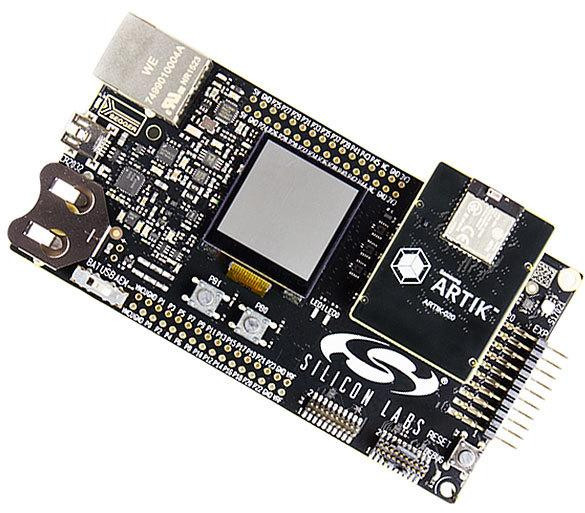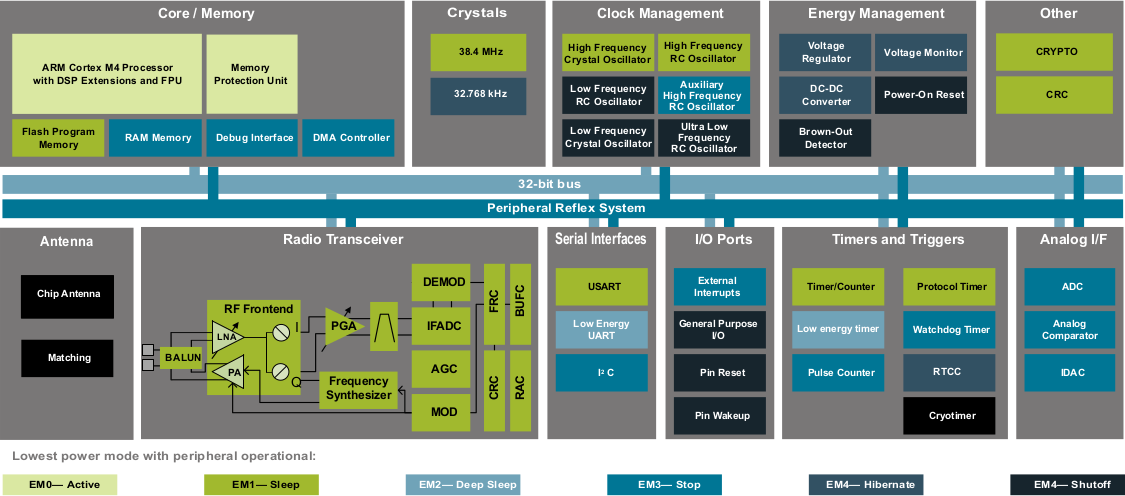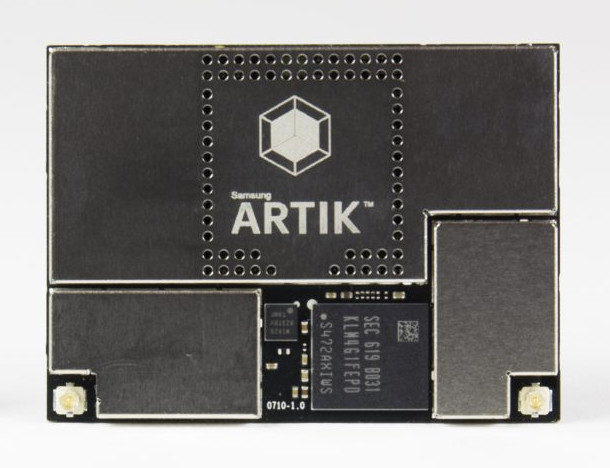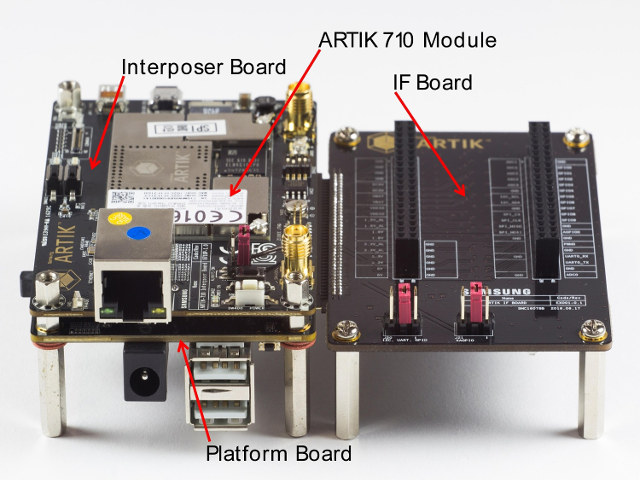Samsung unveiled ARTIK 1, 3 and 5 boards for the Internet of Things in 2015, and started to sell them, together with development with WiFi, BLE and Zigbee connectivity earlier this year. The Korean company has now announced two new family with ARTIK 0 modules powered by an ARM Cortex-M MCU and destined to be used in HVAC, lighting, industrial sensors, personal health monitoring and more, as well as ARTIK 7 family powered by an Octa-core Cortex A53 processor, and targeting IoT gateways.
ARTIK 0 Family

ARTIK 0 family is now comprised for ARTIK 020 with Bluetooth, and ARTIK 030 for applications requiring Thread and/or Zigbee. Beside the different radios, both modules share the same key features:
- MCU – ARM Cortex-M4 up to 40 MHz with Floating Point Unit, 256KB flash, 32 KB SRAM, advanced hardware cryptographic engine with support for AES-128/-256, ECC, SHA-1, SHA-256, and a Random Number Generator
- Peripherals
- 2x USART (UART, SPI, IrDA, I2S)
- Low Energy UART (LEUART)
- I2C peripheral interface (address recognition down to EM3)
- Timers – RTCC, Low Energy Timer, Pulse Counter
- 12-channel Peripheral Reflex System (PRS)
- Up to 25 GPIO with interrupts
- ADC (12-bit, 1 Msps, 326 μA)
- Current-mode Digital to Analog Converter (IDAC)
- 2x Analog Comparator (ACMP)
- 8 channel DMA controller
- Radio
- Artik 020 – 2.4 GHz radio for Bluetooth. Chip antenna
- Artik 030 – 2.4 GHz 802.15.4 radio with integrated balun, support for ZigBee/Thread wireless mesh networking; Up to + 10 dBm Tx power. Antenna: chip antenna or u.FL variant for external antenna
- Power & Consumption
- 1.85 to 3.8 V DC input
- Energy Mode 2 (Deep Sleep) Current: 2.5 μA (Full RAM retention and RTCC running from LXFO)
- Operating Temperature – -40 to +85°C
- Certifications – FCC, IC, CE, Aus/NZ, Korea certifications (pending)
- Dimensions – 12.9 x 15.0 x 2.2 mm

Samsung did not disclose the MCU vendor, but considering Silicon Labs made SIP-KITSLF001 evaluation kit for the modules, it has to be one of their Gecko MCUs, especially the getting started guide explains how to install Silicon Labs Simplicity StudioTM 4.0…
Artik 0 modules costs about $5 to $6 on Digikey or Mujin (Korea), while the evaluation kits go for $99 and $499 (must be a mistake) respectively for ARTIK-020 and ARTIK-030. You’ll find more technical information on Samsung ARTIK 0 family product page.
ARTIK 7 Family

ARTIK 7 family is at the other range of the spectrum with an octa-core processor running Linux, and there’s currently only one member with ARTIK 710:
- SoC – 8x ARM Cortex-A53 processor @ 1.4 GHz with 3D graphics accelerator
- System Memory – 1 GB DDR3 @ 800 MHz
- Storage – 4 GB eMMC flash
- Display I/F – 4-lane MIPI DSI interface up to 1080p24
- Audio – I2S interface
- Camera – 4-lane MIPI CSI interface
- Connectivity – 802.11 a/b/g/n/ac WiFi, Bluetooth 4.1 classic + LE, 802.15.4 radio for Zigbee or Thread
- Analog and Digital I/Os – GPIO, I2S, SPI, UART, SDIO, USB 2.0, JTAG, Analog input
- Security – Trustware TEE, secure point-to-point authentication and data transfer
- Power Supply – PMIC
- Dimensions – 49 x 36 mm
The module comes pre-installed with Fedora Linux and shares the same getting started guide as ARTIK 5 and 7 modules. A development kit comprised of ARTIK 710 module, an interposer board with Ethernet, micro USB OTG, micro HDMI, LVDS and antenna connectors connected through USB to a platform board with USB ports, MIPI DSI & CSI connectors, micro SD card, audio jack, a battery connector & power jack, itself connected to an IF board to access to more I/Os via the “Expansion Connector Interface”.

ARTIK 710 module sells for around $50 on Digikey, while SIP-KITNXE001 kit with all three boards and the module goes for $199. Visit Samsung ARTIK 7 Family product page for more details, including datasheet, and hardware and software guides.

Jean-Luc started CNX Software in 2010 as a part-time endeavor, before quitting his job as a software engineering manager, and starting to write daily news, and reviews full time later in 2011.
Support CNX Software! Donate via cryptocurrencies, become a Patron on Patreon, or purchase goods on Amazon or Aliexpress





I would guess that the Artik0 uses an EFM32 Pearl Gecko with added radio, the specifications seems to match up:
http://www.silabs.com/products/mcu/32-bit/efm32-pearl-gecko/Pages/efm32-pearl-gecko.aspx
I must correct myself. I actually found these boards on silabs web site, albeit with the wireless modules looking a bit different (like no shielding can). This is probably the work Samsung did, creating a module and certifying it.
Zigbee and thread:
http://www.silabs.com/products/wireless/mesh-networking/efr32-mighty-gecko/Pages/mighty-gecko-zigbee-thread.aspx
Bluetooth smart:
http://www.silabs.com/products/wireless/bluetooth/efr32-blue-gecko/Pages/blue-gecko-bluetooth-smart-soc-starter-kit.aspx
The prices for these dev. kits matches the ones you wrote. I think the zigbee/Thread kit has 3 nodes and the bluetooth smart only has one, hence the price diference.
By comparing specs the ARTIK 710 seems to be based on Samsung/Nexell S5P6818 SoC (used on NanoPi M3 and NanoPC T3 and currently limited to run on an old 3.4.39 kernel). Samsung said for ARTIK 710 they provide Linux 4.1 LTS support including DRM/GPU drivers so that might be good news for enthusiasts playing around with S5P6818 dev boards (trying to port code).
S5P6818 is the fastest cheap SoC I tested so far (12 GFLOPS Linpack/OpenBlas with NEON optimizations at 1.4GHz) but I doubt it is able to perform like that on the Samsung module since consumption is way too high under full load and both heatsink and fan would be needed to cool this thing down if it’s busy for more than 30 seconds.
S5P6818 cheap? It is $19 CPU.
@Jon Smirl
Oops, I got the impression that it must be cheap since NanoPi M3 is just $35.
Artik 10 is phased out, Samsung recommends using Artik 7 instead -> http://www.tizenexperts.com/2017/02/samsung-stops-production-artik-10-boards-recommends-use-artik-7/